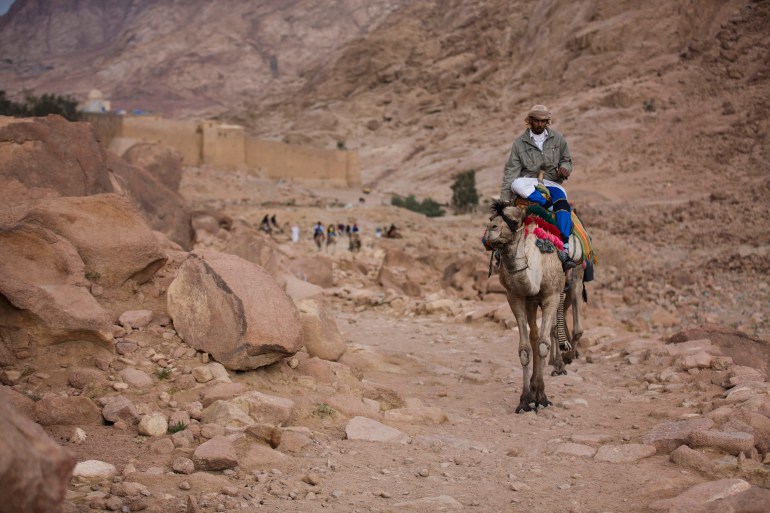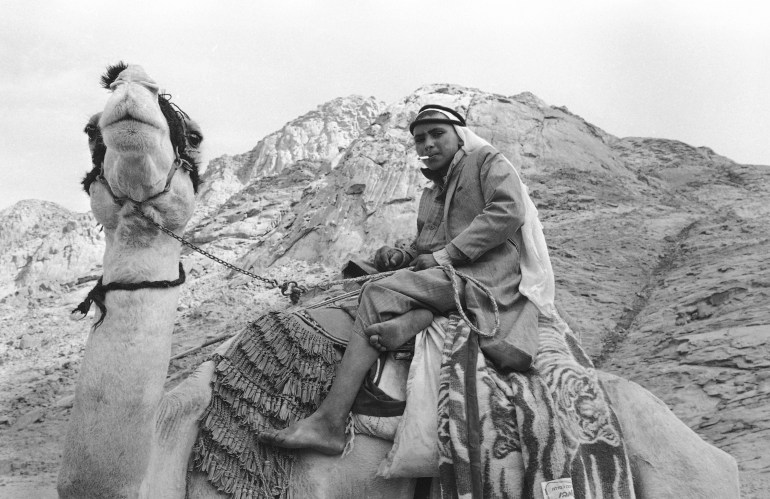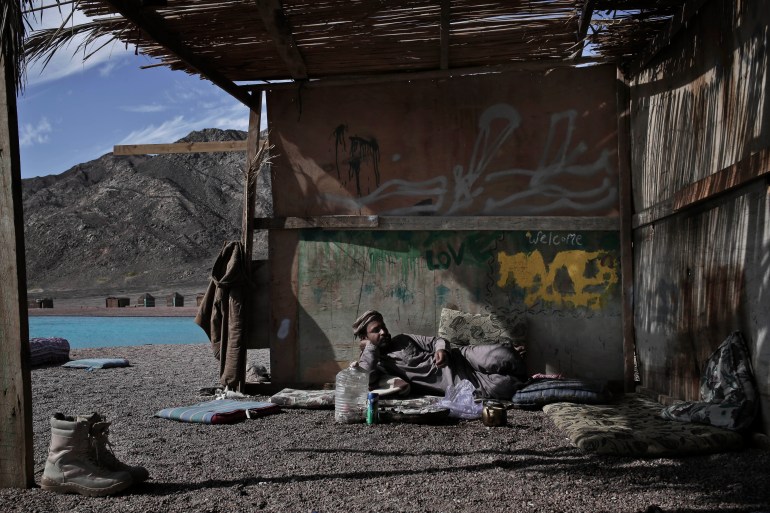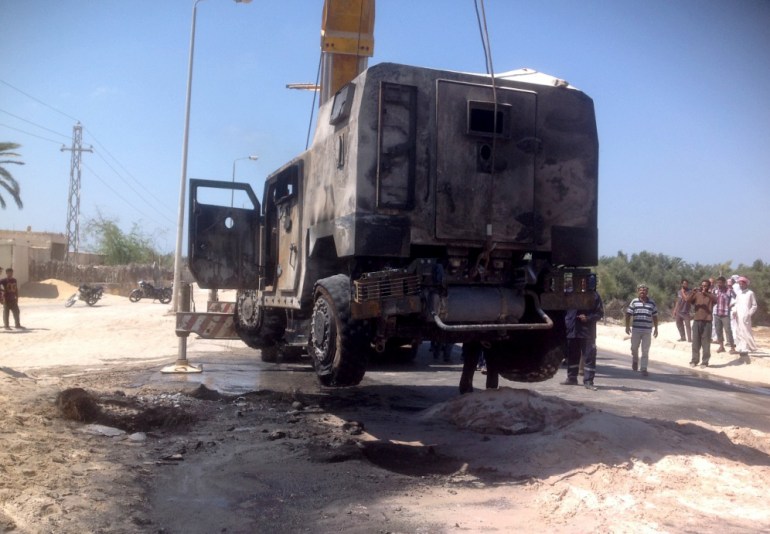As Israel’s battle on Gaza nears the tip of a second month, Rehab Eldalil worries about reviews of efforts by Israel to push the two.3 million individuals of the besieged Gaza Strip into the Egyptian Sinai Peninsula – her ancestors’ dwelling.
President Abdel Fattah el-Sisi has publicly acknowledged that Egypt won’t enable a displacement of Palestinians, as it could imply “the end of the Palestinian cause” and a possible menace to Egypt’s nationwide safety. However information reviews have urged that Israel may provide to repay a few of Egypt’s huge public debt in alternate for permitting the pressured displacement of individuals from Gaza into Sinai.
Eldalil, an Egyptian photographer and storyteller of Bedouin descent, worries that that sort of narrative “takes away the right of Palestinians to stay on their land, while promoting that Sinai is an empty desert for Palestinians to go to”.
It isn’t, and hasn’t been for hundreds of years.
The 61,000sq km (23,500sq mile) triangle of land that bridges Africa and Asia is a well-liked vacationer vacation spot, a big spiritual and historic website, and an necessary financial centre for Egypt. It’s dwelling to a number of oil and pure gasoline fields, in addition to the Suez Canal, one of many world’s busiest delivery routes, which generates as much as $9bn yearly.

The peninsula, its northern two-thirds taken up by the Sinai Desert and the mountainous south boasting St Catherine, Egypt’s highest peak, has additionally lengthy been dwelling to myriad Bedouin tribes, who lived in keeping with their traditions for hundreds of years, some ultimately settling into cities.
These communities have typically been uncared for by the authorities, and have been collateral harm in nationwide or regional geopolitical conflicts. Now, the battle on Gaza is elevating fears for Bedouins.
Sinai’s first natives
Earlier than colonial powers drew borders to create the nations within the area immediately, the Arabian Peninsula, the Levant and North Africa have been linked by service provider routes that supplied the area a typical language. The vectors of this phenomenon have been the Bedouin Arab tribes.
Ultimately, Eldalil says, “These communities … they stopped being nomads, they settled as the first natives of this desert over 1,000 years ago,” one thing she would hear from the elders of her tribe, the Jabaliya (individuals from the mountain).
“At the beginning, they split the Peninsula into seven major tribes,” she says, which have now developed into a complete of 33, in keeping with specialists.
Eldalil, who has a number of visible tasks about Bedouin identification and heritage, says the legacy of those authentic tribes remains to be alive.
“Embroidery is a huge tradition that the community still practices, as well as Bedouin traditional poetry, where they get to tell their stories,” she says.

And there may be the Bedouin legislation. “If there is an issue… they would have a sit-down between the families in dispute and fix it in a more civilised manner that you would see in many progressive countries,” she says.
“They have their own set of rules and unspoken laws, something that with time has created a lot of issues between them and the government, just like it happens with any other indigenous community in the world,” Eldalil provides.
Their deep connection to the land has added to these tensions with the authorities, she says. “They are able to walk for days and weeks within the desert, they know every inch of sand and corner of the mountains. They know their land so well that it becomes intimidating, and there arises a need to control them.”
Coping with Israel
Scholar Hilary Gilbert says Bedouins have an “environmental identity”, primarily based on her many years of analysis into Bedouin life.
“They see themselves as being an integral part of the natural world, and so they see themselves very much as its guardians,” the College of Nottingham analysis fellow in anthropology and improvement added.
Many of those “guardians of the natural world” refused to depart their land when Israel invaded the Sinai Peninsula in 1967, an occupation that lasted 15 years, resulting in quite a lot of suspicion directed in direction of them from many non-Sinai Egyptians, Gilbert mentioned. “A popular belief was that Bedouins were collaborating with the Israelis, an ingrained prejudice against them on the basis that they’re different, uncultivated and untrustworthy,” she added.
“When Israel left and the Egyptians took over the government again, they adopted a sort of policy of benign neglect of the Bedouins.”
For years, Bedouins discovered it exhausting to entry their rights as residents. Nationwide identification playing cards and paperwork have been practically unimaginable to come back by, faculties, hospitals and public companies have been scarce, and coming into the military was forbidden.
When Sinai was “discovered” within the late Eighties as a area that would make Egypt a tourism income, the Bedouins who lived there didn’t profit – actually, they discovered themselves displaced and deprived, in keeping with Eldalil.
Throughout 2011’s Arab Spring, the Rafah crossing between Egypt and Gaza grew to become a path for armed fighters and weapons transit, bringing the Sinai Bedouins beneath elevated scrutiny from the Egyptian state. Across the identical time, the rise of armed teams like ISIL(ISIS)-affiliated Ansar Bayt al-Maqdis deepened the Egyptian authorities’s safety issues in Sinai.
When present President Abdel Fatah el-Sisi took energy in 2013, he launched a marketing campaign towards armed teams within the Sinai. That included the creation of a 79km (49-mile) buffer zone in North Sinai, alongside the border with the Gaza Strip, in 2014.
To do this, his forces demolished greater than 3,255 residential, industrial and administrative buildings between 2013 and 2015, and forcefully evicted 1000’s of individuals, in keeping with a Human Rights Watch report.

“My father’s home became sort of a desert,” says Eldalil, whose father used to stay in North Sinai. “All the homes next to him have been deserted because of the campaign to fight terrorism.”
These pressured to depart by the military dispersed to various Egyptian cities, together with al-Arish, Ismailia and Sharqiya, west of the Suez Canal. They have been promised that their eviction can be brief, solely till the “elimination of terrorism”, native sources advised Al Jazeera.
Nevertheless, these communities are nonetheless displaced, though the Egyptian authorities has modified its strategy in direction of the Bedouins since 2018 by allying with totally different tribes to collaborate on intelligence and safety in Sinai.
In August, a few of these Bedouins held a 48-hour sit-in within the southern space of Sheikh Zuweid, demanding the correct to return to their lands. Adopted by guarantees from the authorities that returns would start on October 20, the sit-in was dissolved.
With the mounting safety issues across the Rafah crossing because the hostilities in Gaza began on October 7, native Egyptian authorities appear to have modified their minds.
“The moment came and it was not time to return,” a member of those Bedouin communities tells Al Jazeera.
“In October, dozens of people from the Sawarka and Rumailat tribes gathered again […] but members of the armed forces dispersed the gathering and arrested a number of young people.”

Some organisations that work with refugees started to welcome Bedouins too, in cities like Cairo and Alexandria.
‘Protecting their land’
“The government could easily cooperate with the communities, understand more about the land, about the landscape and how to manage it,” says Eldalil. “After all, protecting their land is one of the biggest sources of pride for Indigenous peoples.”
This can be a sentiment shared by Palestinians who already stay in Sinai.
Mohammed* is among the 1000’s of Palestinians who have been born and raised within the Sinai after the mass expulsion of Palestinians throughout the creation of Israel in 1948, or the Nakba, Arabic for disaster.
“Palestinians in North Sinai make up more than one-third of the population, and even if some of us are still unable to get our Egyptian citizenship because of strict laws, we are treated as Egyptians,” Mohammed says. “Us and Bedouins are the same people, have the same blood.”
Bedouins in Sinai, he says, have been serving to Palestinians who have been caught within the desert when the present battle began, and have been volunteering to supply reduction to injured Palestinians coming from Gaza because the partial opening of the Rafah crossing in early November.
Now, as fears mount {that a} pressured exodus of individuals from Gaza into Sinai might, in flip, displace native communities, Eldalil hopes the federal government will proceed to nurture the connection between Cairo and the Bedouins of Sinai.
“There are in fact people inhabiting Sinai: the Bedouin communities,” she says, “who also have the right to remain on their land, just like the Palestinians”.
*Title modified on the individual’s request to guard their identification.

